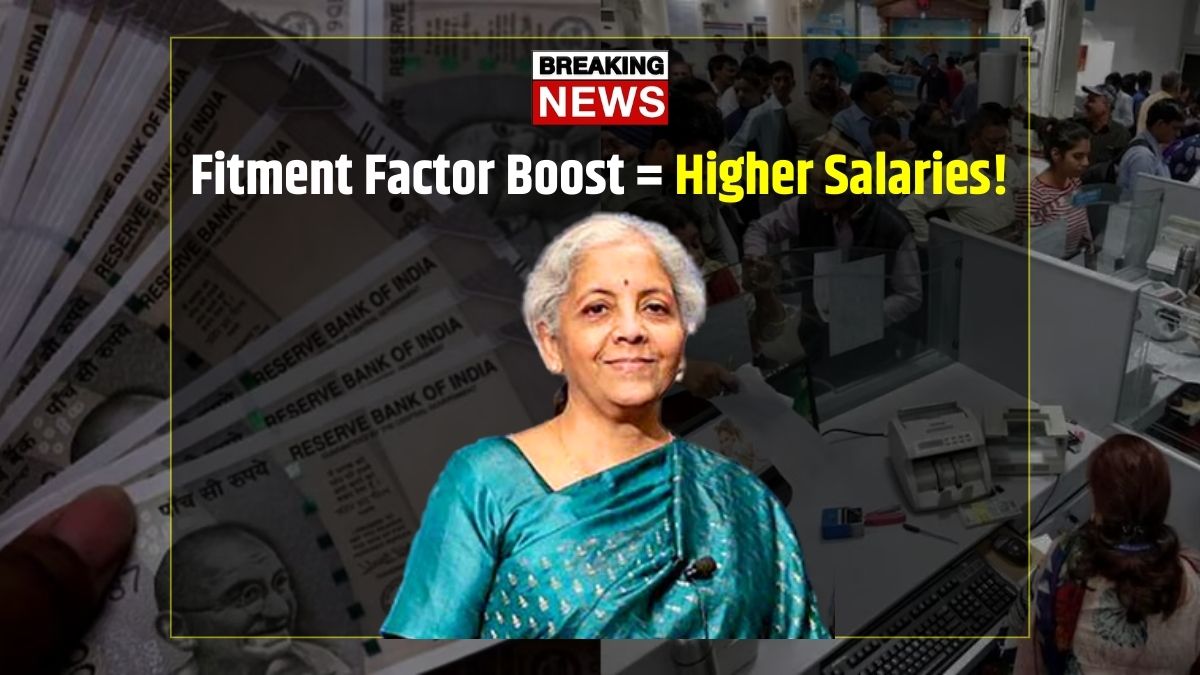Fitment Factor Hike – If you’re a government employee or a pensioner, there’s some exciting news about the upcoming changes in salary structure. The government is set to introduce a significant increase in the fitment factor, which could lead to higher salaries and better pension benefits for millions of employees and retirees. This change, which is expected to take effect in January 2026, is aimed at tackling the ongoing issues related to inflation and boosting the financial security of government workers.
What is the Fitment Factor?
The fitment factor is a key component in determining the basic pay for government employees when a new pay commission is implemented. Simply put, it acts as a multiplier to adjust an employee’s basic salary. For instance, under the 7th Pay Commission, the fitment factor was 2.57. This meant that an employee’s basic salary would be multiplied by 2.57 to calculate the revised salary. With the 8th Pay Commission, this multiplier is set to increase, likely up to 2.86, resulting in a substantial salary boost across all pay bands.
How Will the Fitment Factor Hike Affect Salaries?
Let’s break it down. For example, if an employee currently has a basic salary of ₹20,000, the new fitment factor of 2.86 will increase their salary significantly. The revised salary in this case will rise to approximately ₹57,200. This dramatic change will impact over 50 lakh central government employees and 65 lakh pensioners, enhancing their financial well-being and providing a much-needed boost to their purchasing power.
Benefits for Pensioners
It’s not just employees who stand to gain from the hike. Pensioners will also benefit from the increase in the fitment factor, as their pensions are based on the basic pay. With the new multiplier, pensioners can expect higher monthly pension amounts. Additionally, the increase will likely result in larger arrears, providing pensioners with a substantial one-time financial benefit. This adjustment will provide much-needed relief for retirees, helping them manage rising living costs and inflation.
Economic Impact of the Fitment Factor Hike
This change is also expected to have a positive impact on the broader economy. With government employees and pensioners receiving higher salaries and pensions, they will have more disposable income. This will, in turn, increase consumer demand, stimulating economic activity. As employees have more money to spend, it could also help them cope with inflation and the rising costs of living, further boosting the economy.
When Will the Changes Take Effect?
The 8th Pay Commission is currently in the process of finalizing its recommendations, and these are expected to be completed by mid-2026. The revised salaries and pensions are likely to come into effect from January 2026, with any arrears being paid retroactively. This means employees and pensioners can look forward to a lump sum payment, which could significantly improve their financial situation.
What Does This Mean for Government Employees and Pensioners?
For government employees, this is an excellent opportunity to plan ahead. With a significant boost in basic pay, many employees will be able to save more, invest, and secure a better future. It’s also a great time for pensioners to review their financial planning, as the increase in pension amounts will provide a much-needed cushion against inflation.
Moreover, the increase in the fitment factor is expected to help employees meet the rising costs of living, ensuring they don’t fall behind due to inflation. It’s not just about the immediate benefits either. The long-term financial security of government workers and retirees is set to improve, allowing them to enjoy a more comfortable and secure retirement.
Looking Ahead
This fitment factor hike is a welcome change for millions of government employees and pensioners. While the increase in basic pay and pensions is certainly a major highlight, the overall economic impact cannot be underestimated. By increasing the purchasing power of employees, the government is not just improving their lives but also stimulating the economy.
As we approach 2026, the impact of this policy change will become clearer. For now, it’s safe to say that the government is making strides to improve the financial situation of its workers and retirees, ensuring they can better cope with the challenges of inflation and an ever-changing economy.
The upcoming increase in the fitment factor is one of the most significant changes for government employees and pensioners in recent years. With salaries and pensions set to rise, employees will not only enjoy better financial security but will also contribute to a stronger economy. As we await the full implementation of this change, it’s clear that government workers have a lot to look forward to in the coming years.




